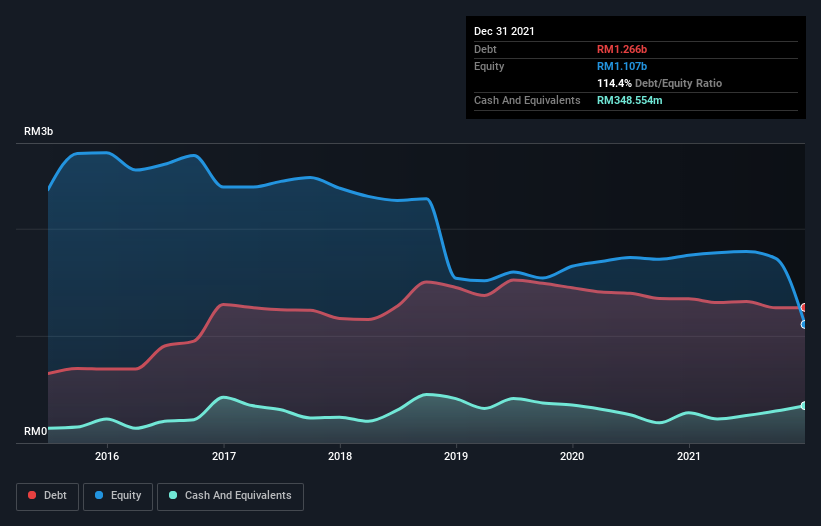- Malaysia
- /
- Energy Services
- /
- KLSE:KNM
Health Check: How Prudently Does KNM Group Berhad (KLSE:KNM) Use Debt?
David Iben put it well when he said, 'Volatility is not a risk we care about. What we care about is avoiding the permanent loss of capital.' So it seems the smart money knows that debt - which is usually involved in bankruptcies - is a very important factor, when you assess how risky a company is. We note that KNM Group Berhad (KLSE:KNM) does have debt on its balance sheet. But is this debt a concern to shareholders?
Why Does Debt Bring Risk?
Debt is a tool to help businesses grow, but if a business is incapable of paying off its lenders, then it exists at their mercy. Part and parcel of capitalism is the process of 'creative destruction' where failed businesses are mercilessly liquidated by their bankers. However, a more usual (but still expensive) situation is where a company must dilute shareholders at a cheap share price simply to get debt under control. Having said that, the most common situation is where a company manages its debt reasonably well - and to its own advantage. When we examine debt levels, we first consider both cash and debt levels, together.
Check out our latest analysis for KNM Group Berhad
How Much Debt Does KNM Group Berhad Carry?
As you can see below, KNM Group Berhad had RM1.27b of debt at December 2021, down from RM1.35b a year prior. However, it does have RM348.6m in cash offsetting this, leading to net debt of about RM917.2m.

How Healthy Is KNM Group Berhad's Balance Sheet?
Zooming in on the latest balance sheet data, we can see that KNM Group Berhad had liabilities of RM1.57b due within 12 months and liabilities of RM568.7m due beyond that. On the other hand, it had cash of RM348.6m and RM454.1m worth of receivables due within a year. So its liabilities outweigh the sum of its cash and (near-term) receivables by RM1.33b.
This deficit casts a shadow over the RM661.7m company, like a colossus towering over mere mortals. So we'd watch its balance sheet closely, without a doubt. After all, KNM Group Berhad would likely require a major re-capitalisation if it had to pay its creditors today. When analysing debt levels, the balance sheet is the obvious place to start. But it is KNM Group Berhad's earnings that will influence how the balance sheet holds up in the future. So if you're keen to discover more about its earnings, it might be worth checking out this graph of its long term earnings trend.
In the last year KNM Group Berhad had a loss before interest and tax, and actually shrunk its revenue by 24%, to RM1.0b. That makes us nervous, to say the least.
Caveat Emptor
Not only did KNM Group Berhad's revenue slip over the last twelve months, but it also produced negative earnings before interest and tax (EBIT). Indeed, it lost RM54m at the EBIT level. When we look at that alongside the significant liabilities, we're not particularly confident about the company. We'd want to see some strong near-term improvements before getting too interested in the stock. It's fair to say the loss of RM601m didn't encourage us either; we'd like to see a profit. And until that time we think this is a risky stock. The balance sheet is clearly the area to focus on when you are analysing debt. But ultimately, every company can contain risks that exist outside of the balance sheet. To that end, you should be aware of the 2 warning signs we've spotted with KNM Group Berhad .
If, after all that, you're more interested in a fast growing company with a rock-solid balance sheet, then check out our list of net cash growth stocks without delay.
Valuation is complex, but we're here to simplify it.
Discover if KNM Group Berhad might be undervalued or overvalued with our detailed analysis, featuring fair value estimates, potential risks, dividends, insider trades, and its financial condition.
Access Free AnalysisHave feedback on this article? Concerned about the content? Get in touch with us directly. Alternatively, email editorial-team (at) simplywallst.com.
This article by Simply Wall St is general in nature. We provide commentary based on historical data and analyst forecasts only using an unbiased methodology and our articles are not intended to be financial advice. It does not constitute a recommendation to buy or sell any stock, and does not take account of your objectives, or your financial situation. We aim to bring you long-term focused analysis driven by fundamental data. Note that our analysis may not factor in the latest price-sensitive company announcements or qualitative material. Simply Wall St has no position in any stocks mentioned.
About KLSE:KNM
KNM Group Berhad
Provides project management, engineering, manufacturing, and maintenance services worldwide.
Slight risk with mediocre balance sheet.
Market Insights
Community Narratives




